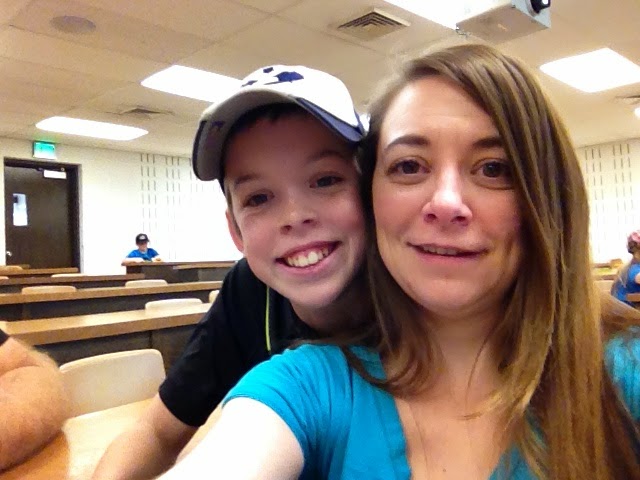Yesterday, in church, our Bishop gave a lesson based on the Ensign article, Can Your Child Really Talk to You? by Brad Wilcox. It is definitely worth the read.
Sometimes I fail to communicate well with this child of mine. So, I am going to be trying to implement some of these suggestions.Notes from the article:
Sometimes children build invisible walls around themselves... They may build them for protection, or perhaps because of feelings of insecurity, distrust, fear, or misunderstanding. How can parents most effectively penetrate such barriers? How do we talk to children who don’t particularly want to talk to us? How do we make ourselves into the kind of people our children will open up to?
We must find a way to remove the obstacle. We can look over the wall, or find a loose brick to let us through, or dismantle it entirely. Although the responsibility for removing obstacles of communication is one shared by both parents and children, this article focuses on what parents can do to help improve communication with their children.Learning to communicate with our children can be done in 3 ways:
- Look over the Wall
- Find the Loose Brick
- Dismantle the Wall.
LOOK OVER THE WALL
Do you love me? Do you care? Am I a priority in your life? Such questions rarely come directly from children, but they do come. Often, the most important part of communication is to hear what isn’t being said. Children’s emotions and needs are usually expressed in coded messages that we must receive and interpret.
Remember when your child was a baby? He cried, and you didn’t know why. You thought, I wish he could just talk to me and tell me what he wants! As children get older, they still don’t know how to voice needs clearly. They just give off signals, and you have to figure out what they really need. In their own way, they may still be crying—only now, the tears are inside.
FIND THE LOOSE BRICK
Rand Packer wrote, “Having laid a few brick walls in my time, I have discovered that every wall has a weakness, a brick that is loose. … My dad had taught me long ago that part of working with young men is discovering the flaws in their armor, the weaknesses in their walls, and then to tap away at them until you gain entrance to their lives” (Congratulations—It’s a Dad, Salt Lake City: Bookcraft, 1982, p. 2). When working with a child who has built a wall around himself, we must find the loose brick—the one interest, dream, or ability that will let us penetrate the wall. A brick may be motorcycles, sports, food, computers, horses, guitars, skateboards, or even journal writing.
Once we locate that loose brick, it may be just a matter of spending the time required to push and pull at it until we break through the wall.
DISMANTLE THE WALL
Dismantling the wall is done in 3 ways:
- Love
- Trust
- Respect
LOVE - Perhaps the reason some parents have difficulty talking with children is the way love is communicated. We tend to take on more of a “boss” role. We exercise authority over them, demand accountability, and then, if they comply and put together a good enough track record, we finally convey our approval and love. That is not how God approaches us as his children.
Our caring and love must be constant—given first, and given freely, through good and bad, transgression or testimony, brilliant success or utter failure. Regardless of their choices, children need our nonjudgmental love.
TRUST - Trust is also important in communication. One parent asked, “How can I trust my child? He is totally untrustworthy.” The truth of the matter is, we don’t have a choice. We can’t follow children around the rest of their lives. In God’s eyes are we, as adults, always totally trustworthy? Yet, Heavenly Father trusts us with many things, including his restored gospel. Perhaps he is giving us something to live up to—focusing on our potential as his children and not on our current problems. Our children need the same message from us.
Trusting relationships can be established by allowing for some freedom and by keeping confidences. Another way to gain trust is to compliment young people.
RESPECT - Showing respect for young people allows for open communication.
The quality of our communication with our children will improve in direct proportion to the amount of respect we show them when we talk together.






















